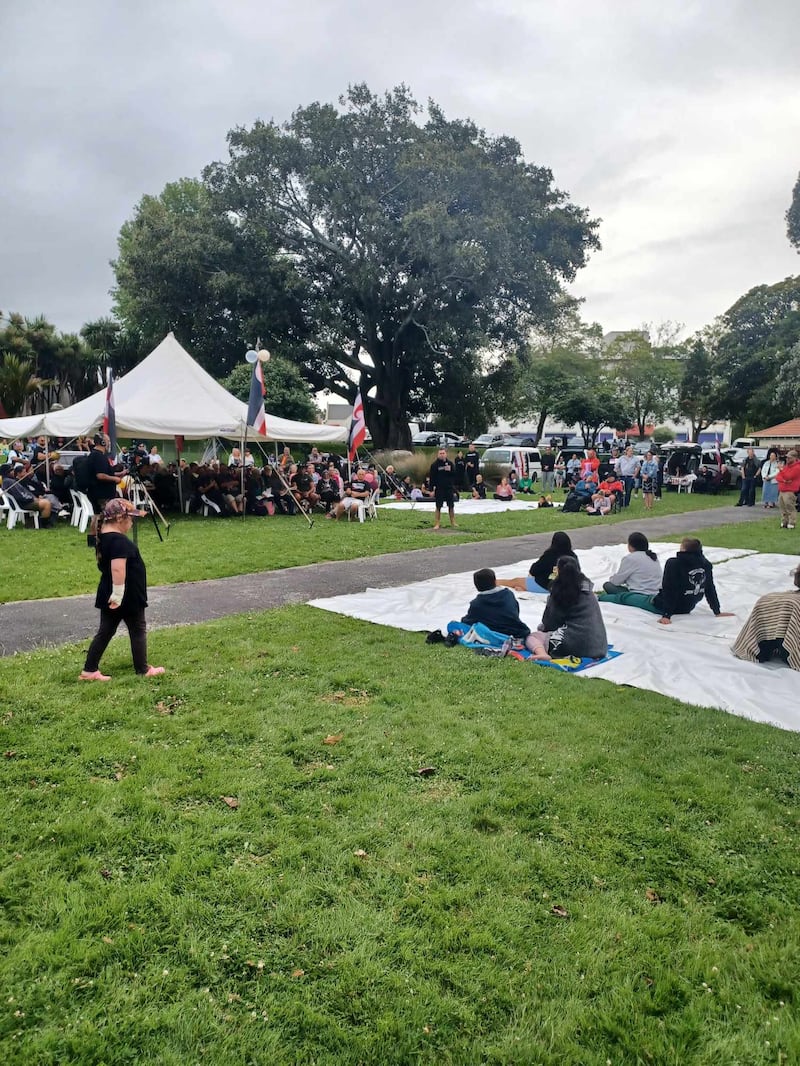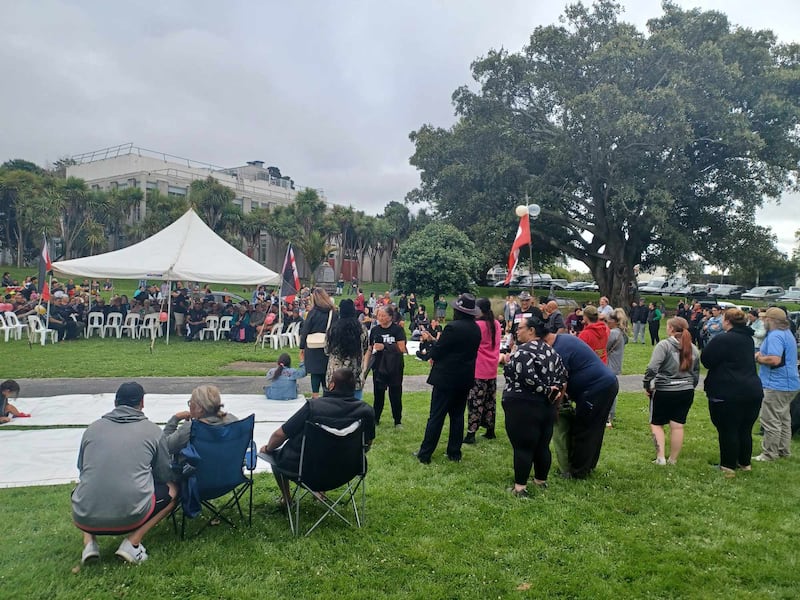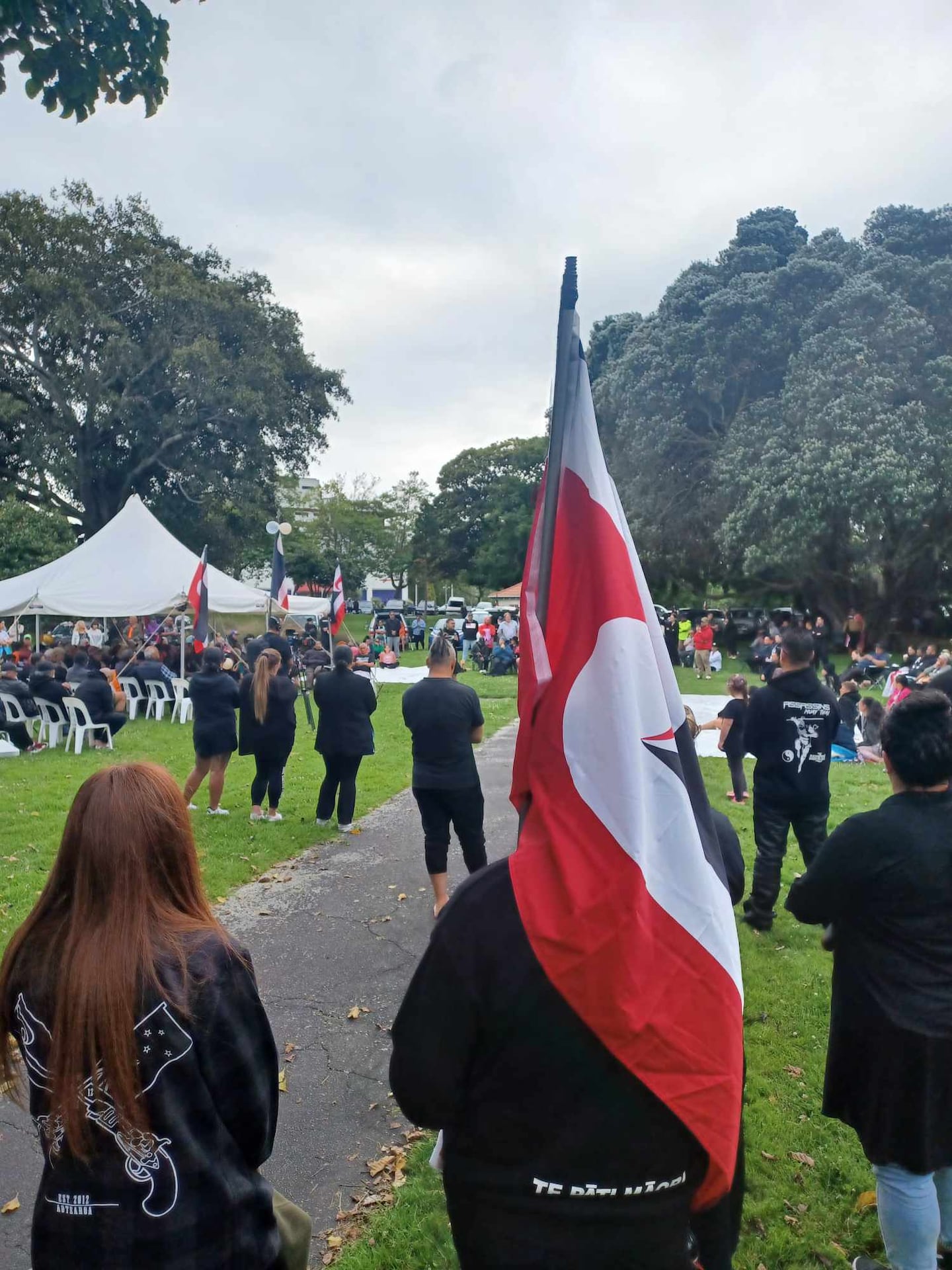Whanganui iwi have gathered at Pākaitore Pā to take a stand against the new National-ACT-NZ first coalition government’s policies.
More than 700 people from all ethnicities, and from all corners of the Whanganui region, attended the gathering to show their support calling for systemic change in this country.
Sheena Maru of Ngāti Rangi, Ngāti Uenuku based at the foot of Mt Ruapehu says the gathering is about looking for better solutions.
“I’m here to support the people and the kōrero and the intent for us to be here at Pākaitore. To kōrero as a community, as whānau, as those of us who are looking for a solution,” Maru says.
Maru says it is also appropriate to hold the gathering at Pākaitore Pā for it was the occupation of Pākaitore, almost 30 years ago, that sparked a 79-day occupation to restore mana to Whanganui Iwi over the site.
“I think about 30 years ago, and I think about the leadership that were here at that time. A lot of them have passed now and some of the ways in which they acted. And we put people in certain places to do certain things. So, for me it tells us that we’re going to be doing it, but probably in a different way.
The long game
“It’s all about the long game and everyone’s talking about mokopuna decisions,“ Maru says.
“So, what we do now is we don’t have to rush at the sugar rush as well. And we have to be really on to it about how we’re going to approach these things. But it’s the long run.”
Ngāti Ruaka descendant Sacha Keating says Pākaitore is a significant place for all residents of Whanganui to live in unity, and the last thing anyone wants is a civil war.
Keating says, “I think this particular place is a place that people feel comfortable regardless of their ethnicity or cultural background. It’s quite a diverse crowd here. And that just shows that people such as this are looking forward to a future, not as just one people, but as a group of people from various backgrounds that can all live together in unity. And I think that’s the whole point that we’re trying to make this evening.”
“I think we need to make the stand right now before things get passed into legislation. Once those things are signed off, and once the democratic process is used against us, then obviously the repercussions are more severe. What we don’t want is a civil war. And if we can have correspondence and negotiation and come out with beneficial agendas for all parties involved, then it’s going to be a greater and safer New Zealand”, Keating says.

From Pūtiki Wharanui Marae based in the city of Whanganui, Raewyn Harrison says they have a three-year strategy to think about.
“I’m really concerned about this new coalition and the kōrero that they’re putting out there,’ Harrison says.
“It’s not good, it’s not healthy, and it’s very destructive. But I’d like to see us gather in our strength and move in a really smart way, in a positive way. We’ve got a three-year strategy to think about, and I think we just start smart and continue to build that momentum.”
Harrison explains how the foreshore and seabed march to Parliament sparked a passion within her to want to make a difference for her people.
“I was one of those Māori who were on the periphery of things looking in. But it was the foreshore and seabed, that hīkoi, that really ignited my passion for getting more involved in what it really meant to be Māori. So, from that moment on I felt truthful to myself, and where I can help make a difference.
“But I think it’s all about working smart. I don’t think blocking our major arteries at this point is the best start we can make because I think, let’s be frank, I think we’re just going to piss a whole lot of people off.
Hayden Potaka of Whanganui and Taranaki descent says Aotearoa has to protect Māori rights moving forward and as the founding document of this country the treaty needs to be protected.
“I have come to have a listen to the discussion about what’s going to happen with some of the policies that the National government has put out in its 100 Day Plan, but more particularly around the principles of the Treaty and how we participate going forward in that because it’s not right.”
“It’s one of those resistances that happened then, and to carry it on is one of the things that we’ve got to do to protect our rights moving forward, whether it’s this kaupapa or whether it’s other kaupapa about our water, about our hauora, and those sorts of things,” Potaka says.
“So, we’ve got to keep fighting to protect it. The Treaty is the foundational document of this country, and we need to protect it going forward, whether it’s changes into something else but it’s a constitutional document that we need to build upon.”
Much of the emphasis of the discussions aimed at the future betterment of the younger and up-and-coming generations,
Manahi Cribb of Ngāti Rangi and Ngā Paerangi, was a child during the occupation of Pākaitore in 1995. He grew up in similar gatherings at Pākaitore throughout his lifetime. Cribb says although many have died, they are being represented by their many descendants present today.
Cribb says, “Ultimately, I want to be a part of what the next few years looks like for us here in Whanganui. I guess taking back a little bit more of our own tino rangatiratanga, putting things in place, what that looks like, how it’s going to play out. He kanohi kitea he hokinga mahara ki rātou mā kua wheturangitia (In seeing familiar faces memories return of those who have passed on) but more so to see those who have gone, their mokopuna here, their uri here, that everyone is here.”
Reneti Tapa of Ngāti Tuera and Ngāti Hinearo says their youth are more educated now and will have a different approach from 1995.
Tapa says, “We can’t sit by and do nothing anymore, especially when the government is doing this to us.
" I think our rangatahi today are going to hold us differently from how we did back during the occupation in 1995. Our rangatahi are more educated now. This is a fight, and this is going to have to be a fight for the government to realise something’s up, something’s not right.”
A nationwide protest by iwi Māori throughout the country has been planned for today. Whanganui iwi will hold its own from 8am at Pākaitore Pā.



